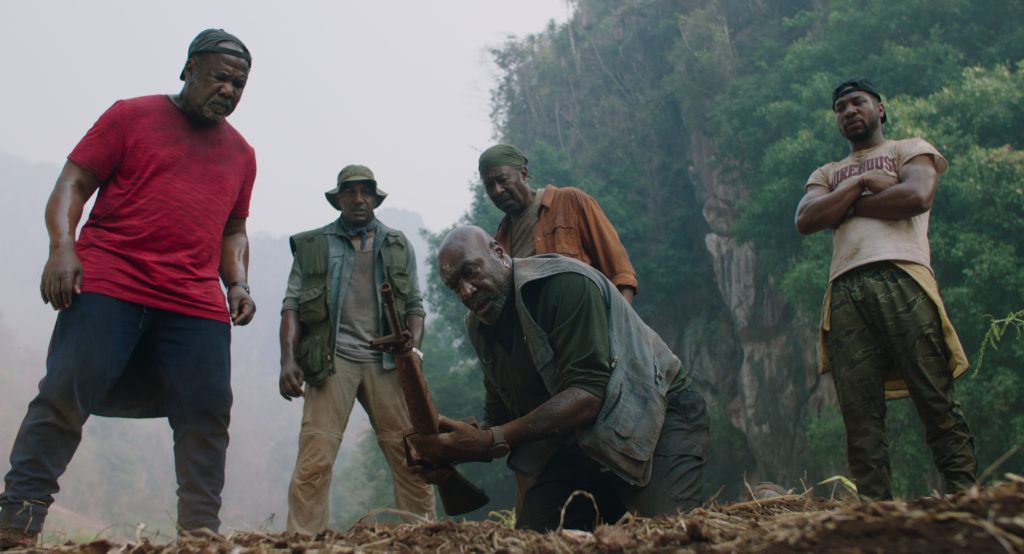Da 5 Bloods

DA 5 BLOODS (L to R) ISIAH WHITLOCK JR. as MELVIN, NORM LEWIS as EDDIE, DELROY LINDO as PAUL, CLARKE PETERS as OTIS and JONATHAN MAJORS as DAVID in DA 5 BLOODS Cr. COURTESY OF NETFLIX © 2020
Spike Lee’s DA 5 BLOODS weaves three strands into one thread: There’s the story whites tell Blacks about who they are, the story Blacks tell each other, and, finally, the story history tells.
Bookended by historical footage of civil rights activists from Muhammad Ali to Kwame Ture to Angela Davis to Malcolm X to Rev. Dr. Martin Luther King, Jr., intercut with film of atrocities we’re used to seeing in still photographs, we believe Lee’s taking us into familiar territory. And just then, he opens the inner narrative on four war veterans revisiting Vietnam in search of their fallen commander, Stormin’ Norman (Chadwick Boseman), and the gold their CIA black op was to deliver as aid to local insurgents.
As they settle in to the local bar for drinks, they’re approached by a young Vietnamese landmine victim asking for change. Between the boy and two former Viet Cong soldiers who buy drinks for the group, Paul (Delroy Lindo) appears psychologically triggered. A Trump supporter, his politics and prejudices belie his pain—compounded by the death of his wife while giving birth to their son, David (Jonathan Majors). Paul and David each suffer from a kind of misplaced, survivor’s guilt—their failure to communicate and commiserate, a direct criticism of toxic masculinity.
“Don’t tell me you voted for President Fake Bone Spurs,” says a fellow veteran. Paul then launches into a tirade about immigrants, just as Otis’ (Clarke Peters) friend and guide, Vinh (Johnny Nguyen), shows up. We get the sense that the two have a deep friendship. Along the way, we discover that the other veterans—Melvin (Isaiah Whitlock, Jr.) and Eddie (Norm Lewis)—have well-adjusted lives and the capacity to make friends and revisit old ones in modern day Vietnam. While they all feel the weight of their leader’s absence, something more burdens Paul.
The crew takes a chopper into the jungle, looking for Norman’s remains and a downed Douglas C-47 Skytrain—the wreckage amidst which they hope to recover the lost gold. The men fight their way through thickets of dense vegetation, minefields, and disagreements over what to do with the money once they find it. Their mythical commander—”He was our Malcolm and our Martin”—wished to redistribute it to the Black community as reparations for being forced to fight for freedoms they weren’t allowed to have.
If BLOODS feels disjointed it’s not that it lacks clarity of vision, though one could argue that Lee’s best work tightly focuses on issues of race. Like BLACKkKLANSMAN, Lee attempts to tell a story about characters whose paths aren’t consumed by racial politics, but are nonetheless beset on all sides. But he also undermines his own message, failing to flesh out the Vietnamese characters. We learn, for example, that Otis had a relationship with a Vietnamese woman, Tien Luu (Y.Lan), but there’s no depth to the character. She serves as a plot point.
What makes the movie compelling, however, on top of Lindo’s award-worthy performance, is the meta-commentary. In one of numerous biographical inserts, we see PFC Milton Olive III—the first Black Medal of Honor recipient, who died throwing his body on a grenade to protect his platoon. Flashbacks shot like a television drama, the Bloods all appear as their older selves—save for Norman, forever frozen in time. The film implicitly asks: Where are all the movies about Black war heroes?
Spielberg, whose childhood was spent shooting 8mm amateur World War II epics with his friends, got to make his SAVING PRIVATE RYAN. Lee’s mother introduced him to the universe of cinema at an early age. Certainly, one feels the influence of THE TREASURE OF THE SIERRA MADRE. Here, we might think that Paul’s MAGA hat-wearing version of Fred C. Dobbs turns Huston’s classic on its side. But does it?
Muhammad Ali and others are quoted as pointing out the absurdity of fighting a war for freedoms Black people don’t even have… Just as in Lee’s DO THE RIGHT THING, the resentment at one end of the economic spectrum directed toward another minority at the opposite appears hypocritical until we understand how each ended up there.
Under the Fulbright-Hays Act of 1961 and the Immigration and Nationality Act of 1965, the United States courted highly-skilled, highly-educated Asian Americans, rather than investing in elevating African-Americans out of income inequality. The film points out that thirty-two percent of G.I.’s in Vietnam were African-American despite being only eleven percent of the population.
In this regard, DA 5 BLOODS illustrates how white people pit minorities against one another. We come to understand Paul as not just a cowed, old man, but a complex mixture of fear and guilt: fear of those who would take away what little dignity and security he’s created for himself inside a system that hates him, and guilt over the ones he’d left behind to maintain the appearance of the same.
When a group of us formed the Southern Christian Leadership Conference, we chose as our motto: To save the soul of America. We were convinced that we could not limit our vision to certain rights for Black people, but instead affirmed the conviction that America would never be free or saved from itself until the descendants of its slaves were loosed completely from the shackles they still wear…. Now, it should be incandescently clear that no one who has any concern for the integrity and life of America today can ignore the present war. If America’s soul becomes totally poisoned, part of the autopsy must read: Vietnam.
-Rev. Dr. Martin Luther King, Jr.